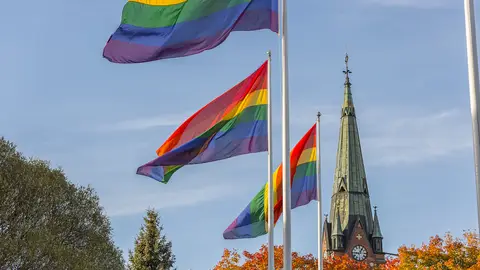How One London Church Became a Safe Haven for Trans People of Faith

Despite England, Scotland, and Wales legalizing marriage equality in 2014, a very limited number of places of worship actively perform these ceremonies. Only 182 of the more than 40,000 churches in the U.K. hold same-sex marriages; even fewer are explicitly committed to LGBTQ inclusion. These unwelcoming environments, combined with the current government’s intention to drop plans to allow for gender self-identification, means trans people of faith have access to few safe places of worship.
London’s Oasis Church Waterloo, led by Baptist minister Rev. Steve Chalke, is one of only a handful of places of worship in the city that have pledged to be trans-inclusive. As its founder, Chalke has called for all churches to offer "radical inclusion" to transgender people and worked with LGBTQ rights group Stonewall U.K. to create a guide supporting this goal.
For Chalke, it’s easy to answer why Oasis has adopted the goal of radical inclusion. “I think it's in the job description from Jesus,” he tells NewNowNext. “As I read Jesus’ words and I listen to his stories, there is a call to radical inclusion. Everyone counts, and everyone is made in the image of God—it’s a Christian responsibility.”
Few other religious leaders have the same viewpoint as Chalke, leading some trans parishioners to either hide their true self from other worshipers or leave their church entirely. Research from Stonewall U.K. found that one in four trans people of faith aren’t open about their gender identity with their faith community.
Rev. Steve Chalke.
Chalke believes it’s not enough for churches to just tolerate or accept LGBTQ people. Openly embracing and celebrating trans members alongside everyone else is central to his mission. “We believe that every church should be a place of sanctuary and welcoming to everyone,” he adds.
The inclusive reputation of Oasis Church Waterloo attracted Stephenie Robinson, a community member who had previously dealt with churches that didn’t fully welcome her as a trans woman of faith.
“I've been around churches quite a lot, and I've been reasonably open about my gender identity,” she tells NewNowNext. “Some churches really didn't like it at all and others felt my presence kind of split the church into two halves; one who said it's fine, come on board, and another saying no to me.”
Robinson recalls a petition circulated at her last church that asked worshipers to agree that same-sex marriages should not take place in the space. When the petition came her way, she stood her ground and didn’t sign it. “If this is what you want, I can't be part of this,” she remembers saying.
When Robinson tried to create a group for trans people of faith at her old church, leadership told her they didn’t want to be associated with such a group. Oasis Church Waterloo, however, offered a completely different experience. “When I went to check out Oasis there were all these inclusive people there,” she says. “I was quite surprised. Members of the LGBTQ community seem to be well represented, as well as different families, heterosexuals, you name it.”
On the Sunday after her first visit to Oasis, Robinson had a meal with some other church worshipers, where she found out they had been praying for someone like her to turn up on their doorstep. Soon after, she created the Trans Oasis Resources Community Hub (TORCH), a mutual support group exclusively for trans people at Oasis. Members share personal stories without judgement, isolation or exclusion in a safe environment. All are welcome, from Christians to people of other faiths or those interested in joining a faith community.
Stephenie Robinson.
“Normally what ends up happening is people just talk about what's going on in their lives since the last meeting over tea and biscuits,” Robinson says. “Others who attend the meetings can offer advice from experiences they've had or discuss anti-social behavior in the area where they live.”
Before the COVID-19 pandemic, TORCH held meetings every month with 12 of more trans people of faith in attendance. Members still keep in touch via text messaging, and there are plans to return to in-person gatherings when it is safe to do so.
Conversations at TORCH cover far more than faith issues, with members also working to mitigate some of the difficulties unique to the trans experience. In practice, this can mean everything from connecting members with their local hate-crime officer or talking about how to apply makeup.
“There are all these kinds of opportunities to share that information where they wouldn't have it if they were living in isolation and didn’t have access to [a community] like this,” Robinson adds.
While some churches may be unwelcoming to trans people, Oasis and sub-groups like TORCH ensure that if a trans person comes to the church, they'll be accepted for who they are.
“If a trans person wants to get involved in any part of the church, there's no opposition,” Robinson says.“You can be part of the worship team. If you want to be on the welcome team, you can be on the welcome team—there’s no hindrance, where you might hear in other churches, 'Yes, you come along and you might be able to be a member but you can't do certain activities.' Oasis is different. It’s truly welcoming.”





